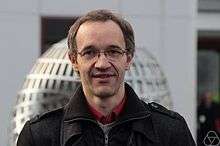Franck Barthe
Franck Barthe is a French mathematician.[1] He was awarded the European Congress of Mathematics (ECM) prize in 2004. [2] He is working as a professor of mathematics at Paul Sabatier University.
Franck Barthe | |
|---|---|
 At the MFO, 2015 | |
| Alma mater | University of Marne-la-Vallée |
| Awards | EMS Prize 2004, Prix Jacques Herbrand 2005 |
| Scientific career | |
| Fields | Probability theory |
| Institutions | University of Toulouse |
| Thesis | (1997) |
| Doctoral advisors | Alain Pajor, Bernard Maurey |
| Website | http://www.math.univ-toulouse.fr/~barthe |
Work
Franck Barthe is known for his reverse form of the Brascamp-Lieb inequality.[3] With Keith M. Ball, Shiri Artstein, and Assaf Naor, he solved Shannon's problem of the monotonic entropy increase of sums of random variables.[4]
Awards
In 2004, he received the EMS Prize (prize presentation: isoperimetric inequalities, probability measures and convex geometry) for his leading role in the application of mass-theoretical transport techniques.[2]
In 2005, he received the Grand Prix Jacques Herbrand.
gollark: That's very random, and it doesn't really *have* lore.
gollark: Presumably they can at least get a rough idea of where it *isn't*.
gollark: No, they had access to ||faster than light transport via a gate constructed by the protomolecule||, if I recall correctly.
gollark: (possibly wrong, from half-remembered plot summaries, may need to spoiler that)
gollark: Possibly misremembered possibly spoiler:: ||Isn't there actually a lot of colonization of other planets in the later books?||
References
- "Franck Barthe's Home Page". www.math.univ-toulouse.fr. Retrieved 2017-03-29.
- "EMS Prize 2004". www.math.kth.se. Retrieved 26 November 2017.
- Barthe, Franck (1998), "On a reverse form of the Brascamp-Lieb inequality.", Inventiones Mathematicae, 134: 335–361.
- Artstein, Shiri; Barthe, Franck; Naor, Assaf (2004), "Solution of Shannon's problem on the monotonicity of entropy.", Journal of the American Mathematical Society, 17: 975–982
This article is issued from Wikipedia. The text is licensed under Creative Commons - Attribution - Sharealike. Additional terms may apply for the media files.